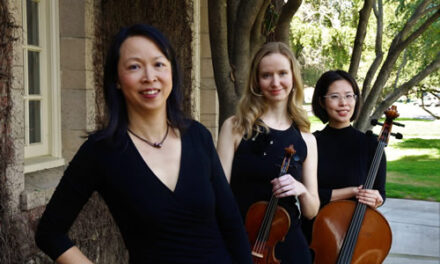“Rising Stars,” the Raleigh Symphony Orchestra‘s annual spotlight of young North Carolinian musicians, has traditionally been paired with the presentation of Meredith College‘s Concerto/Aria competition, a similar opportunity for the musicians of Meredith’s Department of Music. 2022’s highly anticipated pair of concerts found the full RSO orchestra finally in complete force again for this tradition after the pandemic. Excepting the soloists, Friday’s and Saturday’s program of symphonic music is exactly the same – a delightful panoply of colorful music that seemed like great fun to play. Conductor Dr. Jim Waddelow gracefully led the program of overwhelmingly cheery works; soprano soloist and junior Music Education major Grace Raphun’s two Handel arias were a lamenting foil and provided great contrast to close the concert.
First, Rossini’s Overture to La Gazza Ladra (The Thieving Magpie), beginning with a menacing snare drum that belies the sunny melody to come, showcased RSO’s strong balance in all the full orchestral moments. The strings in particular were extremely solid here, especially through the buoyant triple melody featured in the overture’s middle sections. Waddelow’s gesture remained easygoing, guiding the orchestra through contrasting sections and meters. RSO’s lower instruments had their time to shine, too, with a very pleasant united bass and brass melody, leading to an extended cadential push to the finish.
“The Walk to the Paradise Garden” from Frederick Delius’ opera A Village Romeo and Juliet is lesser-performed than some of the other selections on this program, and the entire opera is rarely staged, but the Raleigh Symphony’s performance made it easy to let my imagination create the backdrop. Languid and serene, a woodwind serenade begins the music, and all members of the woodwind section are highlighted amidst the strings’ consistent legato texture. Excellently sensitive phrasing from the entire string section helped create a dreamy atmosphere that would have been perfectly synced with an old black-and-white romance movie. Later, the cellos brought a remarkably bluesy melody out from the orchestra’s texture, and the ending’s gentle swells were just as smooth as the beginning.
RSO’s performance of Vaughan Williams’ English Folksong Suite made me want to sing along with the energetic melodies presented therein. This version for symphonic orchestra has potentially more opportunities for varied texture than the original wind ensemble conception. The first movement, March: “Seventeen Come Sunday,” conjured seafaring imagery with its powerful bass, joyful melodic variations, and occasional pizzicato strings. The middle movement, Intermezzo: “My Bonny Boy,” included an expertly played canon between low and high strings, and the pastoral and dancelike March: “Folk Songs from Somerset” put the percussion section on display with both snares and triangle galore.
As mentioned above, Raphun’s Handel arias, “Lascia ch’io pianga” and “Piangeró la sorte mia,” feature a great amount of weeping in their thematic drive compared to the previous works; the sorrows of Rinaldo and Giulio Cesare formed a beautiful setting as the RSO matched phrasing with Raphun’s mellow soprano voice. The B section of the former aria added some dramatic passion to the unhurried texture; the latter aria’s middle section contained vocal intricacies backed by the orchestra in a supporting role. Together in a set, the two arias created beauty within pain and closed the compact but varied program.
The RSO performs again Saturday with “Rising Stars,” featuring these same symphonic works and introducing competition winners Kyrese Washington and Jonghee Yoon, playing the first movements of Neilsen’s Concerto for Flute and Orchestra and Guilmant’s Organ Symphony No. 1. Tickets are available online at RSO’s website or at the door. $27 adults, $22 students/seniors, $10 children. Meredith College students and faculty can attend free with ID.











